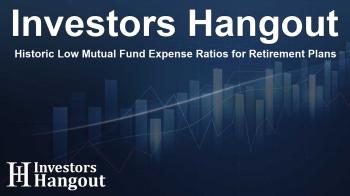Historic Low Mutual Fund Expense Ratios for Retirement Plans

Historic Low Mutual Fund Expense Ratios for Retirement Plans
Retirement savers invested in 401(k) plans can rejoice as recent research highlights that mutual fund expense ratios have reached historic lows. A report by the Investment Company Institute (ICI) showcases a thriving environment for these savings plans, making them a cost-effective option for many American workers looking to prepare for their financial futures.
Positive Trends in Expense Ratios
According to the ICI, there has been a notable decline in the average expense ratios for mutual funds utilized within 401(k) plans. Over the years, this figure has consistently decreased: from 0.76 percent in 2000 to an impressive 0.26 percent in 2024—a dramatic decline of about 66 percent. This trend is not limited to equity funds; hybrid and bond mutual funds have similarly seen reductions of 44 percent and 69 percent, respectively. Such dramatic drops reflect a continuing positive trend for retirement investors.
Why Lower Costs Matter
Lower costs are essential for investors hoping to maximize their retirement savings. Sarah Holden, Senior Director of Retirement and Investor Research, remarked, "The long-term downward trend in mutual fund fees for more than two decades is great news for investors looking to secure their financial future." This sentiment emphasizes the importance of cost management and the strategic approach taken by plan sponsors to optimize investment options.
Key Insights from the Report
The ICI's report reveals several important findings regarding mutual fund investments in 401(k) plans:
- At the end of 2024, 401(k) assets reached an astounding $8.9 trillion, with a significant 38 percent allocated to equity mutual funds. Participants who invested in these funds incurred an average expense ratio of just 0.26 percent, well below the industry average of 0.40 percent.
- Several aspects contribute to these favorable rates, including heightened market competition, decisions by plan sponsors to subsidize costs, and economies of scale enjoyed by large retirement plans. It’s also notable that many 401(k) plans minimize reliance on professional financial advisors, which helps keep expenses down.
- A further point of interest is the consistent decline in the expense ratio of target date mutual funds, which have dropped from 0.67 percent in 2008 to 0.29 percent in 2024, highlighting the growing efficiency and accessibility of these investment vehicles.
Conclusion
In summary, the landscape of mutual fund expense ratios for retirement savers is looking brighter than ever. With decreasing costs throughout the years, 401(k) participants have access to a wider pool of investment options that can provide both performance and value. The continued diligence of plan sponsors in managing investment selections emphasizes their commitment to safeguarding the financial wellness of employees.
Contact: For further inquiries or more information, please reach out via email.
Frequently Asked Questions
What are mutual fund expense ratios?
Mutual fund expense ratios represent the costs incurred by investors to manage their investments. These costs include management fees and administrative expenses.
Why are lower expense ratios beneficial for investors?
Lower expense ratios help investors retain more of their returns, increasing the overall growth of their investments over time, especially in retirement accounts.
How have mutual fund expenses changed over the years?
Mutual fund expenses have seen a significant decrease, dropping from 0.76 percent in 2000 to around 0.26 percent in recent times, benefitting 401(k) plan participants.
What factors contribute to lower expense ratios in 401(k) plans?
Factors include competitive market dynamics, plan sponsor decisions to reduce costs, economies of scale, and prudent investment choices made by sponsors and participants.
What is the significance of target date mutual funds?
Target date mutual funds are designed to automatically adjust their asset allocations over time, making them a convenient option for long-term retirement investment.
About The Author
Contact Owen Jenkins privately here. Or send an email with ATTN: Owen Jenkins as the subject to contact@investorshangout.com.
About Investors Hangout
Investors Hangout is a leading online stock forum for financial discussion and learning, offering a wide range of free tools and resources. It draws in traders of all levels, who exchange market knowledge, investigate trading tactics, and keep an eye on industry developments in real time. Featuring financial articles, stock message boards, quotes, charts, company profiles, and live news updates. Through cooperative learning and a wealth of informational resources, it helps users from novices creating their first portfolios to experts honing their techniques. Join Investors Hangout today: https://investorshangout.com/
The content of this article is based on factual, publicly available information and does not represent legal, financial, or investment advice. Investors Hangout does not offer financial advice, and the author is not a licensed financial advisor. Consult a qualified advisor before making any financial or investment decisions based on this article. This article should not be considered advice to purchase, sell, or hold any securities or other investments. If any of the material provided here is inaccurate, please contact us for corrections.

